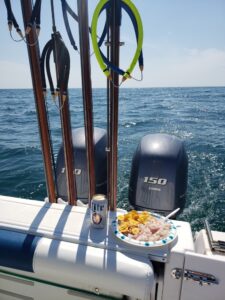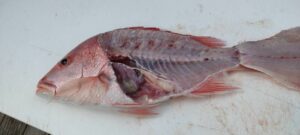
Fish harvested in Gulf of  Mexico federal waters must be maintained with head and fins intact until they are landed. However, it is legal to eat some fish during your fishing trip. This article will explain how both things can be true at the same time, and give you the information you need to legally consume fish onboard your vessel.
Mexico federal waters must be maintained with head and fins intact until they are landed. However, it is legal to eat some fish during your fishing trip. This article will explain how both things can be true at the same time, and give you the information you need to legally consume fish onboard your vessel.
For some, it’s common practice to make a quick ceviche, eat some sashimi, or even grill up a whole snapper while underway, or at a sandbar, before you head home from a day on the water. If you’re already doing this, or it sounds like a good idea in the future, read on to learn how to ensure you’re doing it legally.
First, it’s important to know that there is a per person limit of up to 1.5 pounds of fillets, or fish parts, for personal consumption at sea. Any fish you eat are subject to all the season, size, and daily possession limits. For example, if you’ve harvested two red snapper and decide to eat one at sea, you’ve met your bag limit for the day and can’t harvest an additional red snapper to replace the one you’ve consumed. It’s also useful to note that there are no requirements to retain the carcass of the filleted fish once you’ve cleaned and/or consumed it.
Next, in order to legally possess 1.5 pounds of fish exempt from the heads and fins intact requirements, your vessel must be equipped to cook finfish on board. For those of you with a grill aboard, that shouldn’t be an issue. However, it’s not so simple for those of you that prefer ceviche or sashimi. Common and frequently used definitions of the word “cook” all point to the process of heating food. Given this common usage of the word, vessels must be equipped with something that can properly cook the fish with heat. The simple presence of limes for ceviche, or wasabi and soy sauce for sashimi, would not qualify the vessel for exemption from the head and fins intact requirements. You can still consume raw fish aboard, just be sure you also have something that can properly heat the fish should you be asked to prove you have everything necessary to qualify for the personal consumption exemption.
Finally, this allowance for consumption at sea does not apply to highly migratory species (tunas, billfish, and sharks) under any circumstances. So, as delicious as it may be, eating yellowfin tuna sashimi is not permitted until you’re back at the dock.
For you reference, thespecific regulations on this issue can be found here.

